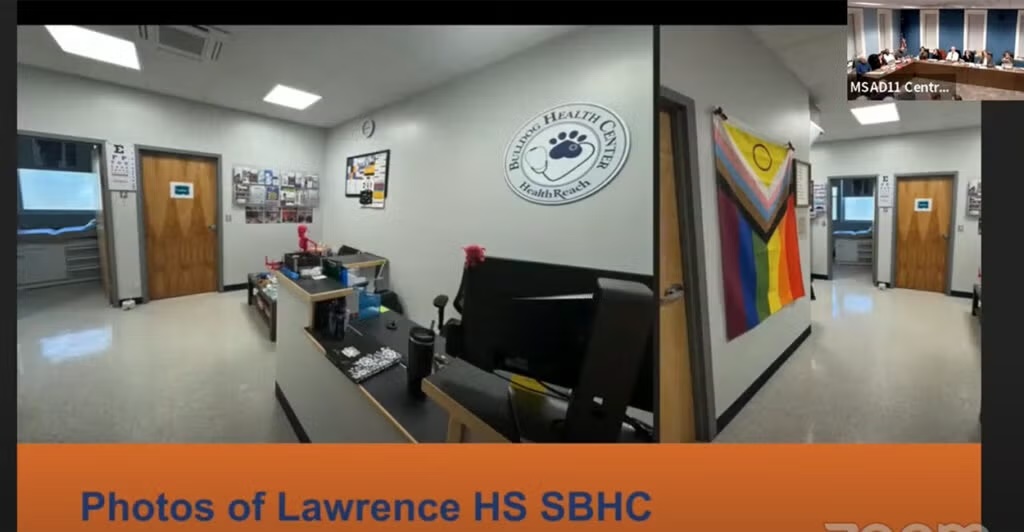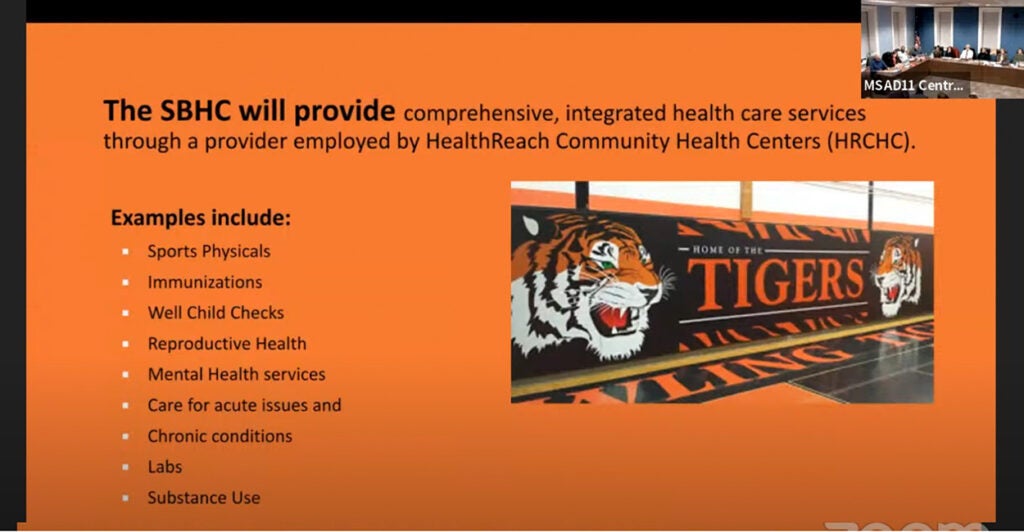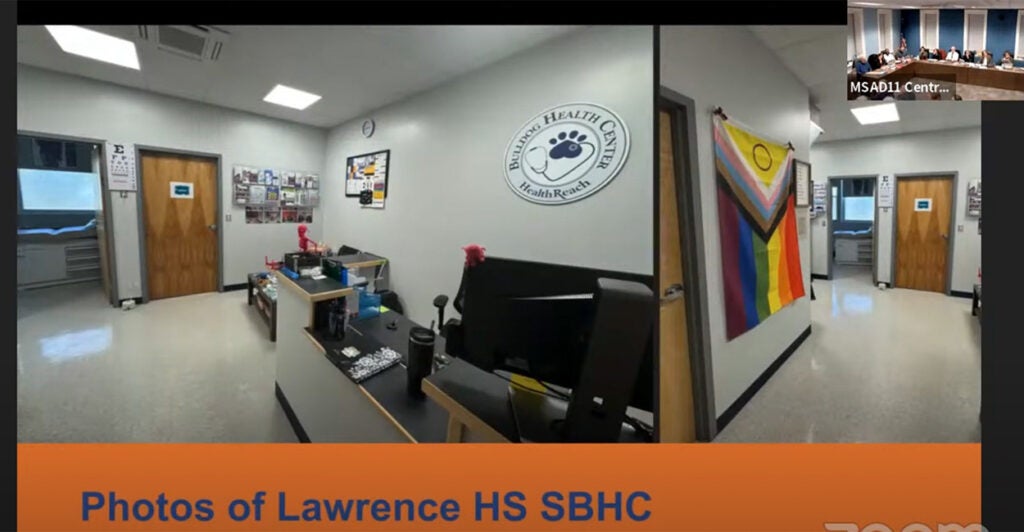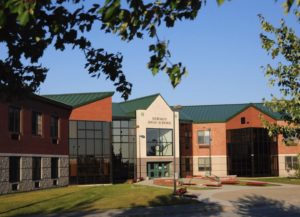Parents outraged Maine school clinic could give students confidential ‘reproductive health care’
(The Daily Signal) – A Maine high school may open a new health clinic that would give students confidential “reproductive health care.” At other school-based health centers, that term has been…

(The Daily Signal) – A Maine high school may open a new health clinic that would give students confidential “reproductive health care.” At other school-based health centers, that term has been a euphemism for transgender drugs and birth-control prescriptions.
Maine School Administrative District 11 voted on Dec. 5 to review the contract for a school-based health center that can provide confidential “mental health, reproductive health, and substance use” care to minors who “demonstrate decision-making capacity.” MSAD 11 comprises schools in Gardiner, West Gardner, Pittston, and Randolph, Maine.
School-based health centers have a history of providing so-called gender-affirming care to minors, often without parental consent. A 2023 Maine lawallows 16-year-olds to access transgender hormone regimens without parental consent.

In Assistant Director of HealthReach Community Health Centers Diandra Staples’ presentation at the meeting, she listed several examples of health centers’ services. Staples elaborated on the details of every service on the list, but provided no description for “reproductive health.”
Maine School Administrative District 11 Superintendent Patricia Hopkins told The Daily Signal if approved, “the health center will not prescribe hormone blockers.”
“Reproductive health care could include education, counseling about birth control options, or the provision of birth control,” Hopkins said.
Alvin Lui, founder of Courage Is a Habit, a parental rights group exposing MSAD 11’s potential health center, said many school-based health centers take direction from Planned Parenthood. The abortion giant defines “reproductive health care” as birth control, “abortion care,” the “morning-after pill,” and “LGBTQ health,” such as “gender-affirming hormone treatment.”
As of 2022, there were about 3,900 school-based health centers in the United States. Many of them have been exposed for offering transgender medical interventions and counseling to minors.
For example, the San Lorenzo High School-Based Health Center in Ashland, California, offers access to “gender-affirming care,” including “chest binders, shapewear, etc.”; “information and counseling about transitioning”; and “gender-affirming hormone therapy and other types of medical transitioning services.”
Parents Defending Education exposed the school-based health centers at Nova High School and Meany Middle School in Seattle, Washington, for providing “gender-affirming care” at school.
The Seattle health centers are operated by Country Doctor Community Health Centers, which offers “gender-affirming medications (estrogen, androgen blockers, testosterone, etc.) and injection techniques,” “hormone therapy for adolescents and specialty referrals for younger patients as needed,” and “referrals for gender-affirming surgeries.”
Students were able to get “prescriptions for short-term hormonal birth control like the birth control pill” without any parental consent form at Evanston Township High School in Illinois, according to the student newspaper.
School-based health centers are part of the Centers for Disease Control and Prevention’s Whole School, Whole Community, Whole Child model, which focuses on the “connections between health and academic achievement.” The CDC and affiliated groups claim that school-based health centers, often established in “low-income communities,” improve academics and behavior.
But studies done in 2020 and 2023 found that giving students an on-campus clinic and psychologist had “no statistically significant” effect on students’ academic performance.
The CDC recommends school health centers “create their own referral systems for youth-friendly sexual health services,” particularly for LGBTQ-identifying kids.
Staples said in her presentation that it’s the health centers’ “goal” to include parents.
“Students may start out confidential,” Staples said, “but the goal is always to have as much support as possible and include guardians when appropriate.”
“Parents can choose if their children are involved” in the health center, she said, “with the exception of confidential services.” These include “mental health, reproductive health, and substance use.”
A “medical clinician” determines if the minor has the necessary “decision-making capacity” to consent to confidential services.
Schools often use those caveats to exclude parents who do not support their child taking transgender hormones or birth control, Lui, the parental rights activist, told The Daily Signal.
“So, in other words: ‘Our goal is to involve the parents only if the parents agree with the transgender ideology, and use the right pronouns for the child and agree with cross-sex hormones and puberty blockers,’” he said, mockingly. “‘But if they don’t, then we can’t include them.’”
Five percent of students received confidential services from the health center at nearby Lawrence High School in Fairfield, Maine, Staples said. Staples’ presentation showed a picture of Lawrence’s health center, which features a massive Progress Pride Flag.

The MSAD 11 school board is required to make public its agenda for upcoming meetings at least five business days prior. The school board waited until the night before Thanksgiving to publish the plan to discuss the health center.
“They waited until the last moment,” Lui said, “hoping that they could use the Thanksgiving cover so that no one’s paying attention.”
Staples also said in her presentation that the health centers purchase medical supplies like IUDs for clinics from providers. She listed “family planning,” also known as birth control, as one of the centers’ goals.
“These medical clinics being placed directly in the schools are providing as much sex-based treatment from IUDs to birth control, which is leading to side effects that then lead into more depression pills,” said Allen Sarvinas, Maine chapter chair of Parents’ Rights in Education.
The mother of a middle schooler at MSAD 11, who asked to remain anonymous for fear of retaliation, said she is unsettled by the prospect of a school health center providing confidential services to her child.
“I feel extremely terrified and uneasy as MSAD 11 has repeatedly danced upon the trust of many parents over various topics for a multitude of years,” she said.



